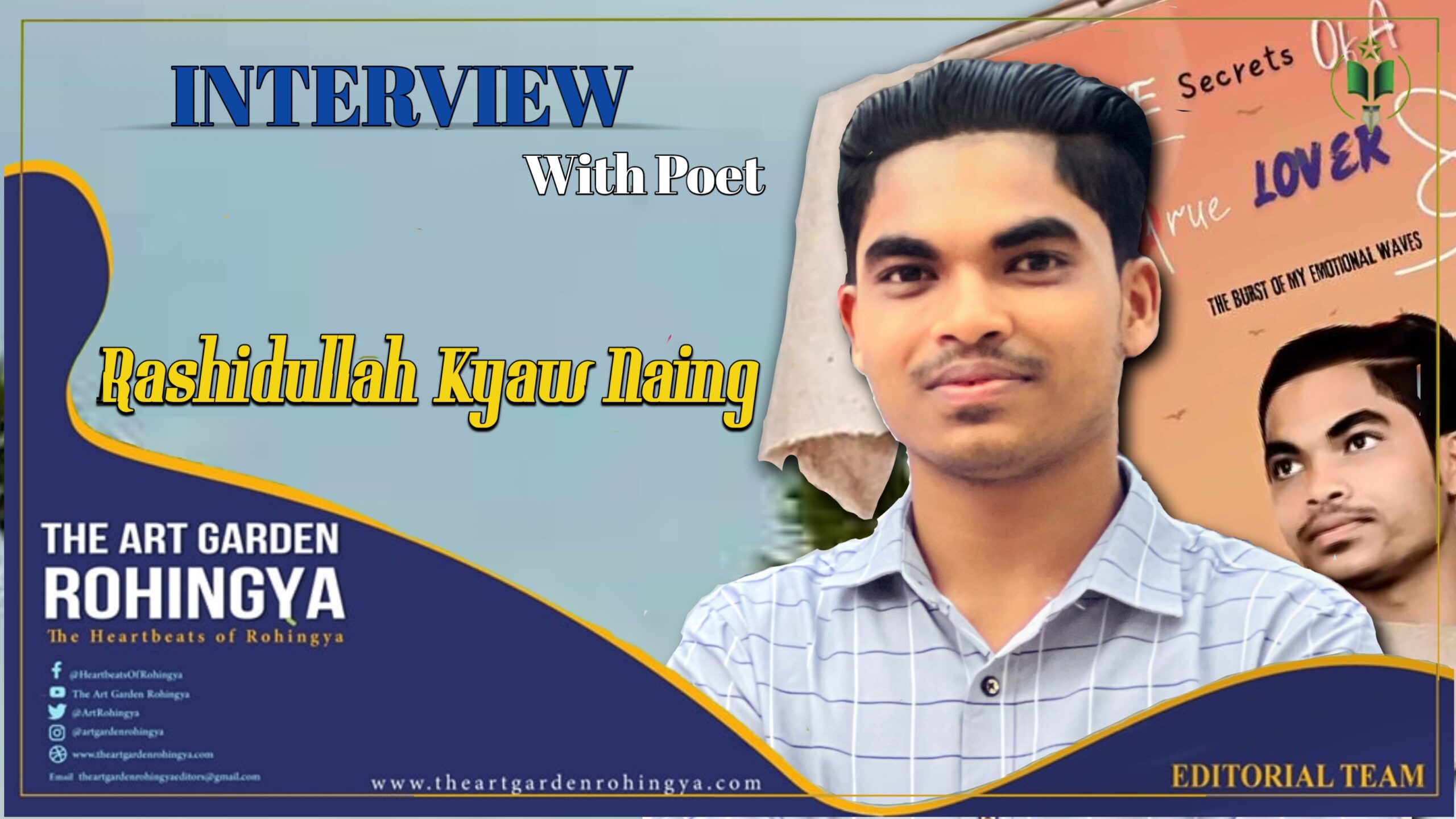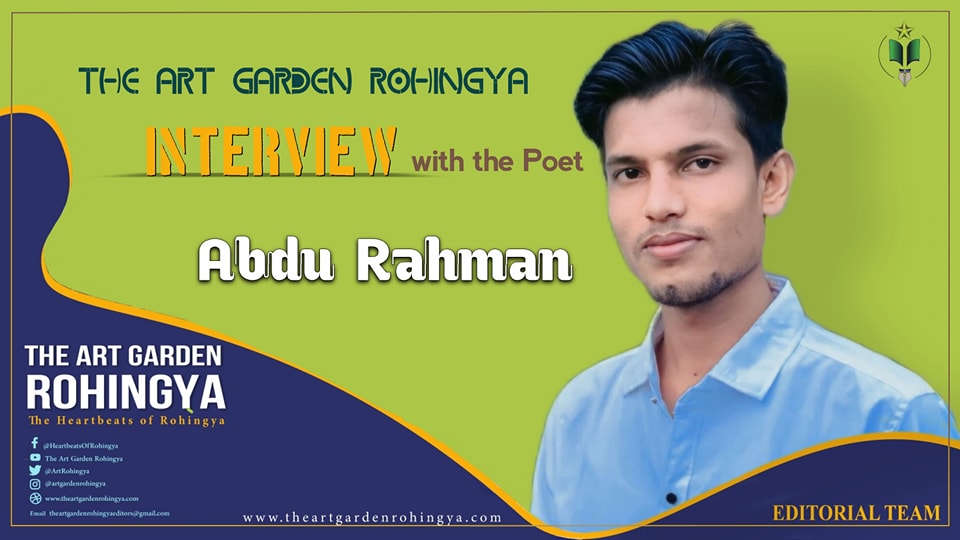The Art Garden Rohingya Interview With the poet Roshidullah Kyaw Naing
The Art Garden Rohingya is the first Rohingya community poetry and art platform. Our mission encompasses the publication of poetry and diverse art forms across print, online platforms, and social media. Through these activities, we aim to elevate Rohingya writers and artists, while concurrently advocating for the enrichment and promotion of Rohingya literature, culture, tradition, and art. Additionally, we conduct interviews with our poets and artists to gain insight into their perspectives on literature and artistic creation.
The opinions and views in the following interview are solely those of the poet and artist and do not necessarily reflect the Art Garden Rohingya.
AG: Can you please tell us something about yourself? Your name, age, and township you were born in Myanmar?
RKN: “My name is Roshidullah@Kyaw Naing. I am a 20-year-old Rohingya poet, researcher, teacher, humanitarian worker, freelancer, and storyteller. I am also the author of “The Painful Life of Rohingya: The Voices of Genocide Survivors to The World” and “The Secrets Of A True Lover: The Burst Of My Emotional Waves”. I was born in Nurrullah village, Maungdaw Township, Rakhine (Arakan) State, Myanmar. Currently, I live in Kuala Lumpur, Malaysia.”
AG: What is your best memory in your childhood in Myanmar?
RKN: “My childhood was characterized by love and care, as I was the beloved grandson of my paternal grandfather. We reside together in a house with a large backyard, where a substantial tree stood. Under its shade, my grandfather and I would sit, as he imparted his wisdom and encouraged me to lead a life characterized by honesty, kindness, respect, and education. The cherished moments spent with him remain etched in my memory. His parting advice to me was “never give up until you reach your destination”.
AG: What inspires you to write poetry? What is the reason behind your poetic expression?
RKN: “My vulnerable Rohingya community is submerged in the profound sea with none to rescue and none to heed the cry of our misery and anguish. I candidly believe that poetry is the most potent means of communicating the dolorous, woeful situations, struggles, and suffering of every individual survivor of the genocide who inspires me to write poetry. Through writing poetry, I articulate my emotion and daily experience, so that the unheard may listen and the unseen may perceive my voice”.
AG: Are there any specific poets or writers whom you admire and draw inspiration from?
RKN: “Yes, I have great admiration for poets and writers like Rabindranath Tagore, Allama Mohammad Iqbal, William Shakespeare, and George Orwell. Their poetry resonates with me the most and encourages me to explore the essence of poetic expression.”
AG: How many poems have you published, so far in the Art Garden Rohingya and other outlets?
RKN: “Eight of my poems have been published in The Art Garden Rohingya, comprising four in English, two in Burmese and two in Rohingyalish. Additionally, several of my other poems have been featured in international magazines and anthologies”.
AG: How many books have you published so far? Could you tell us about your books briefly?
RKN: “I authored two poetry books. The first book is “The Painful Life of Rohingya: The Voices of Genocide Survivors to The World” published in 2022. The second one is “The Secrets of A True Lover: The Burst Of My Emotional Waves” published recently. These books are available globally through various platforms, including websites, apps, Amazon, and Google Books”.
AG: Can you tell us about a poem or a piece of writing that you are particularly proud of?
RKN: “This is one of my poems published in The Art Garden Rohingya and also included in my book “The Painful Life of Rohingya: The Voices of Genocide Survivors to The World”
My Heart is Crying
My heart is crying for birthplace
My mind is half-dead for it
It became in differences
Colors, from each side despair me
Now just about the last breath
Because I can’t control it anymore.
Birthplace is vital for me
I love it forever
So many desires in life of fairness
In any side no faults to get anyone
If even no body suffers as mine
In the world, how I am facing.
I want to die in my birthplace
I was born with one color
In my hometown so much horror
I was indigenous in my homeland
Condition is like I am no-one
Save, if even as my heart is crying
For my birthplace, my mind stays in nowhere.
Homeland is vital for me now
I have been feeling thirst for joy
Of my motherland since years
I have been feeling thirst for peace
I have been feeling thirst for success.
In my land since many years
I have been feeling thirst to develop
Of my nation as one
Just to hold pride in the eyes of the world
But nothing yet I could do in my life
O’ Dear world,
Let me get all what I want!
AG: What is your first published poem? What was your first reaction when you saw it published?
RKN: “My first published poem is titled “The Sunlight”, and it was published in The Art Garden Rohingya. Witnessing its publication evoked feelings of immense pride and excitement within me. The Art Garden Rohingya serves as the paramount platform for Rohingya artistic expression, enabling individuals to convey their emotions and depict the challenges of life through poetry and visual art.”
AG: What are your aspirations for the future?
RKN: “My ambition and purpose in life is to become a software engineer. I am dedicated to utilizing my expertise in software engineering to effect positive change in my community, addressing the current shortage of professionals in this field. At present, I am actively working towards realizing this lifelong dream.”
AG: Who is your ideal person?
RKN: “Mr. Arfat Hossain, a Rohingya instructor of English, Burmese, and Mathematics at a Community Based High school in Cox’s Bazar refugee camps, as an exemplary individual. His constant motivation and encouragement, coupled with his unwavering support towards my success and achievements, have shaped me as a guiding light in my life. He is a my hero, and I admire him the most.”
AG: Can you share your personal experience during the 2016-17 Exodus and how it affected you and your family?
RKN: “During the crackdown carried out by the Myanmar military in 2017, I had to leave my home and country, seeking refuge in Bangladesh. I was pursuing my education with aspirations of becoming an educated individual, but my aspirations were extinguished in the flame of genocide. There is nothing harder than forsaking one’s homeland”.
AG: What message do you want to send for your generation?
RKN: “Education is an illuminating force in life. Without education, the world remains shrouded in darkness. I urge the new generation to wholeheartedly embrace education and strive to make meaningful contributions to community. I would like to impart the valuable wisdom of perseverance, echoing the words of my grandfather: never relent in the pursuit of your goals.”
AG: What is your message for the Rohingya community?
RKN: “We are a vulnerable community, having endured genocide in Myanmar. Currently, a majority of the population is displaced in several neighbouring countries. All we seek is justice and freedom in order to return to our homeland. In the present circumstances in Rakhine State, the community unity is the most important for us to securing our future in our homeland.”
AG: According to you, how much the art and culture are important for a community? How would you contribute to reviving and safeguarding the Rohingya art and culture?
RKN: “Art and culture are very important, particularly for a vulnerable community like Rohingya. Art and culture have magnetic power to bring the community members together, fostering a sense of belonging and cohesion through shared experiences. Therefore, the choice to focus on art and culture serves as a source of inspiration for future generations”.
AG: Thank you so much for your time and patience doing this interview with us.
RKN: “I expressed my heartfelt gratitude to the editorial team of The Art Garden Rohingya for extending this excellent opportunity to articulate and share my personal sentiments and thoughts through the interview.”
EDITORIAL TEAM




